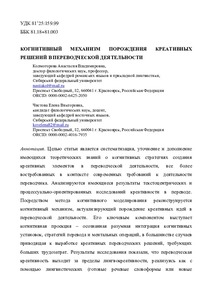COGNITIVE BASIS OF MAKING CREATIVE DECISIONS IN TRANSLATION ACTIVITIES
Скачать файл:
URI (для ссылок/цитирований):
https://l.jvolsu.com/index.php/ru/archive-ruhttps://elib.sfu-kras.ru/handle/2311/142493
Автор:
Чистова, Елена Викторовна
Колмогорова, Анастасия Владимировна
Коллективный автор:
Институт филологии и языковой коммуникации
Кафедра восточных языков
Дата:
2020-08Журнал:
Вестник Волгоградского государственного университетаКвартиль журнала в Web of Science:
без квартиляБиблиографическое описание:
Чистова, Елена Викторовна. COGNITIVE BASIS OF MAKING CREATIVE DECISIONS IN TRANSLATION ACTIVITIES [Текст] / Елена Викторовна Чистова, Анастасия Владимировна Колмогорова // Вестник Волгоградского государственного университета: Языкознание. — 2020. — Т. 19 (№ 3). — С. 59-71Аннотация:
The purpose of the paper is to systematize, refine and supplement the available theoretical knowledge about translation creativity according to the trends of the 21st century. The author describes the available results of searching for creativity in target texts, and exploring it in the translation process, namely in different phases of the translation process, expertise, problem-solving processes, and promoting creativity in translation teaching and learning. The paper provides a cognitive mechanism scheme that launches creative ideas in translation activities. A key component of this mechanism is a cognitive focus – a sort of conscious reasonable integration of cognitive orientations, translation strategies and mental operations, actualizing weak associative links between mental representations available in the information field of the translation subject, in most cases leads to making creative translation decisions that require high efforts. The results of the study showed that translation creativity goes beyond the limits of linguistic creativity, and is realized both with the help of linguistic (ready-made speech word forms or new word-formations), and paralinguistic (color gamut, graphic neologisms, etc.). The examples considered in the article show that generalization, concretization, modulation and language compression are the most productive mental operations of generating creative translation decisions. Strategies for domestication and transcreation also contribute most to the development of translation creativity.
Коллекции:
Метаданные:
Показать полную информациюСвязанные материалы
Показаны похожие ресурсы по названию, автору или тематике.
-
Globalization as an Object of Study (Historical Aspect)
Jacenko, Michel P.; Pfanenshtil, Ivan A.; М.П. Яценко; И.А. Пфаненштиль (Сибирский федеральный университет. Siberian Federal University, 2009-08)Modern condition of historical gnoseology is the result of a complex process of differentiation, which has been going and is going now, differentiation of historical cognition and the birth of historical science. There ... -
Integrated Sociology: Synthesis of Classical, Non-Classical and Post-Nonclassical Approaches in Cognizing the Society
Kuksa, Larisa P.; Л.П. Кукса (Сибирский федеральный университет. Siberian Federal University, 2009-03)The problem of sociological approaches for resolving the situation of the contemporary crisis of the man and society is considered in the article. The aspects discovered in classical, non-classical, and post-nonclassical ... -
The Revival of Psychological Anthropology: a New Understanding of Interrelation Between Cultural and Psychological By Virtue of Cognitive Anthropology and Cultural Psychology
Lourie, Svetlana V.; Лурье, С.В. (Сибирский федеральный университет. Siberian Federal University, 2017-07)The article deals with the history of psychological anthropology revival during the 80-s – 90-s of the XX century after the period of its decline. Psychological anthropology could no longer be regarded as a fully-fledged ... -
Interactivity of Simultaneous Interpreters as Actors of a Cognitive Event
Chistova, Elena V.; Чистова, Е.В. (Сибирский федеральный университет. Siberian Federal University, 2020-03)The paper refers to studying interactivity models of simultaneous interpreters in the field. It describes the process of simultaneous interpretation as a cognitive event considering two participants in the context of ... -
Interactivity of Simultaneous Interpreters as Actors of a Cognitive Event
Елена, Викторовна Чистова (2020-03)В статье рассматривается процесс синхронного перевода в контексте теории распределенного познания. Распределенный характер деятельности синхронных переводчиков подразумевает взаимообусловленность индивидов, языка, коммуникации, ...

